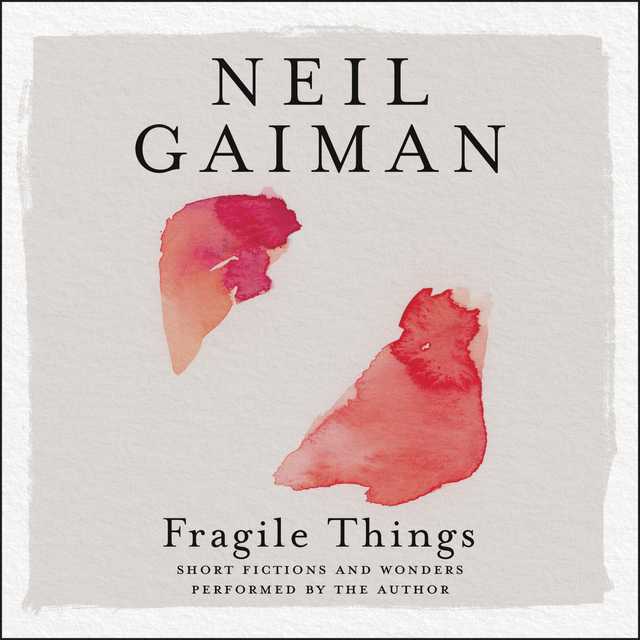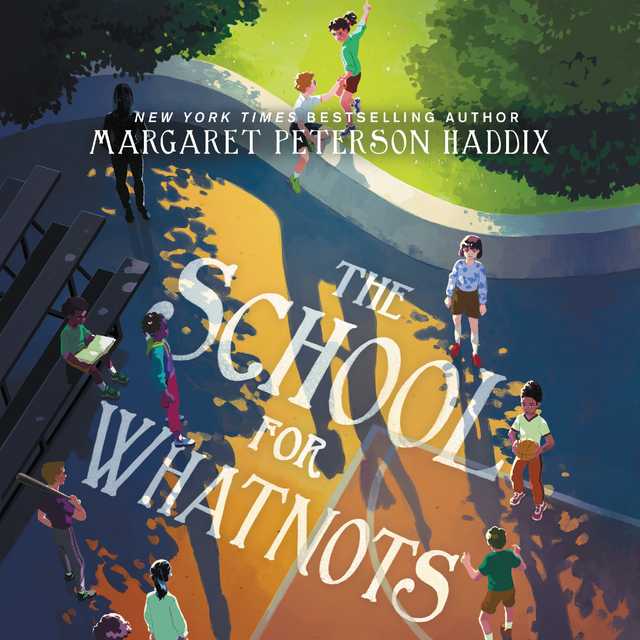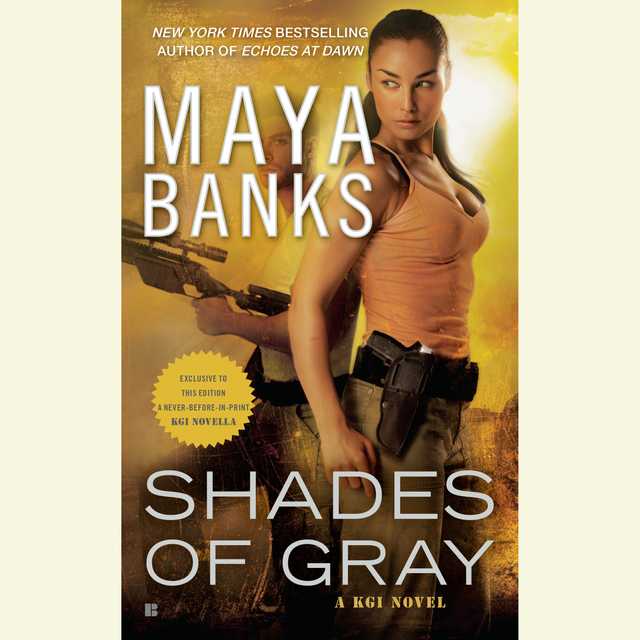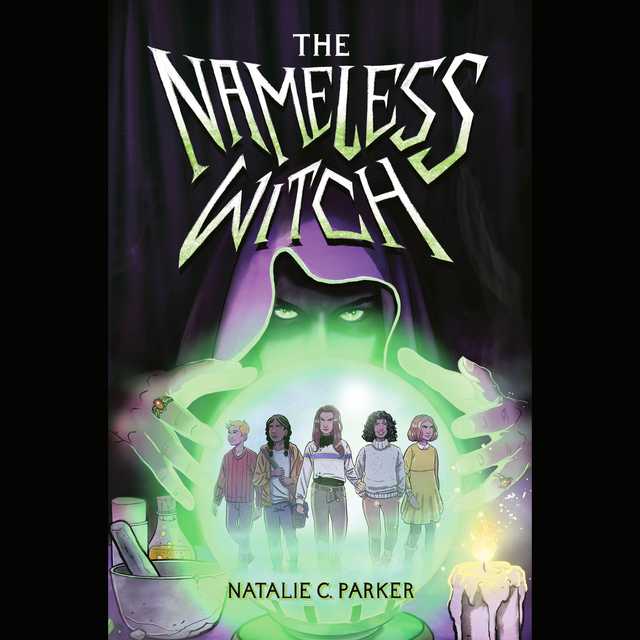Fragile Things Audiobook Summary
“A prodigiously imaginative collection.”
—New York Times Book Review, Editor’s Choice
“Dazzling tales from a master of the fantastic.”
—Washington Post Book World
Fragile Things is a sterling collection of exceptional tales from Neil Gaiman, multiple award-winning (the Hugo, Bram Stoker, Newberry, and Eisner Awards, to name just a few), #1 New York Times bestselling author of The Graveyard Book, Anansi Boys, Coraline, and the groundbreaking Sandman graphic novel series. A uniquely imaginative creator of wonders whose unique storytelling genius has been acclaimed by a host of literary luminaries from Norman Mailer to Stephen King, Gaiman’s astonishing powers are on glorious displays in Fragile Things. Enter and be amazed!
Other Top Audiobooks
Fragile Things Audiobook Narrator
Neil Gaiman is the narrator of Fragile Things audiobook that was written by Neil Gaiman
Neil Gaiman is a #1 New York Times bestselling author of books for children and adults whose award-winning titles include Norse Mythology, American Gods, The Graveyard Book, Good Omens (with Terry Pratchett), Coraline, and The Sandman graphic novels. Neil Gaiman is a Goodwill Ambassador for UNHCR and Professor in the Arts at Bard College.
About the Author(s) of Fragile Things
Neil Gaiman is the author of Fragile Things
More From the Same
- Author : Neil Gaiman
- The Silver Dream
- Chu’s Day at the Beach
- Stardust: The Gift Edition
- Norse Mythology
- Neverwhere
- Publisher : HarperAudio
- Abraham
- American Gods [TV Tie-In]
- Dead Ringer
- House of Sand and Fog
- Prey
Fragile Things Full Details
| Narrator | Neil Gaiman |
| Length | 10 hours 47 minutes |
| Author | Neil Gaiman |
| Category | |
| Publisher | HarperAudio |
| Release date | November 07, 2006 |
| ISBN | 9780061229954 |
Subjects
The publisher of the Fragile Things is HarperAudio. includes the following subjects: The BISAC Subject Code is Fiction, Short Stories (single author)
Additional info
The publisher of the Fragile Things is HarperAudio. The imprint is HarperAudio. It is supplied by HarperAudio. The ISBN-13 is 9780061229954.
Global Availability
This book is only available in the United States.
Goodreads Reviews
s.penkevich
January 30, 2012
’We owe it to each other to tell stories’For years I’ve heard the name Neil Gaiman passed about, weighted with heavy praise, and have always promised myself to read him. Earlier this fall, after hearing him speak on NPR, I sat down with a copy of Coraline, and hungrily read it in one sitting. Despite the novel being intended for an audience much greener than I, I couldn’t help but be hypnotized by the charismatic voice and magical delivery and I renewed my promise to return to this author as soon as possible. More recently, although I was happily buried in a pile of Christmas reading, I purchased his second collection of short fictions, Fragile Things, to revisit this infectious voice and break away from heavier reading into his eerie landscapes. Simply put, this collection was some of the most fun I’ve had in a long time. Filled with many of his Locus award winners, and his Hugo winner, this collection brings many of Gaiman’s works, most of them scattered about in various anthologies, together in one binding. All of the signature excellence with which Gaiman has rightly built his widespread fan-base is present to prove that he is equally wonderful with his short game as he is in novel form and to tell stories which will send shivers down the spines of readers of all ages.There is a vigorous charm about the writing. He lures the reader with lush, simple sentences, which are easy on the eyes, but commanding none-the-less. Once he has drawn you in, cozying up with the reader with a bit of background, the efficacious flow of his phrasing pulls the reader along through the lucid visions of his spectral creations at high speeds in an experience more akin to a thrill ride than just typeface on a page. While Gaiman’s writing isn’t extravagant, the sleek simplicity of it makes it effective to captivate the minds of both the young and old alike. I especially enjoyed Gaiman’s way of affecting a sense of a ‘story within a story’ where he puts near equal emphasis in the context in which the story is told as in the actual tale much like Henry James does in The Turn of the Screw, or Nikolai Gogol does to exemplify the oral tradition of storytelling. This technique is most uniquely present in October in the Chair, which earned the 2003 Locus award for Best Short Story, where the 12 months, each personified in a comical fashion, are seated around a campfire and listen to October tell a chilling tale about a young runaway and his nighttime engagements with the ghost of a dead boy. This helps highlight Gaiman’s pervasive idea of the power stories hold while also allowing him to bring the reader into the story at a safe distance before shocking them. This also allows the author to add a touch of autobiography, as is the case in Closing Time, where he admits that more of the story is ripped from reality than he would like to admit.These stories are just a flat out good time. From aliens to ghost and vampires, Sherlock Holmes and even into the Matrix, these stories will delight and frighten, which brought to mind my childhood of hiding beneath the sheets reading Steven King’s short stories far past bedtime. There is a compelling wit and humor to these tales, many of which reside just on the outskirts of any sense of conclusion, using the classic horror device of allowing the imagination to run wild and fill in the cracks. In stories such as Feeders and Eaters, we never learn the grisly details of exactly why the man has fallen in on himself, but there is enough horrific background to allow for creativity to connect the last few dots. Sometimes the ‘unsaid’ can be mightier than the ‘said’, and the emotion of fear overrides the physical object of terror. Gaiman is also a master at the twist, such as the Hugo winning A Study in Emerald, his Sherlock Holmes A Study in Scarlet inspired tale, which he mixed with a shot of H.P. Lovecraft. As the reader reaches the conclusion they will notice, if they are versed in Holmes lore a bit, an alternate reality that goes beyond the sci-fi elements. The most staggering twist is contained in the very short yet very disturbing Other People, which I would label one of the ‘must reads’ of this collection. A few other points of interest are the short pieces written to accompany a Tori Amos tour book that each reflect a personality from various songs, and a novella dealing with Shadow, the lead character fro Gaiman's American Gods.While many of these stories are first rate, this collection does fall into a few pitfalls that comes with the territory of simply rounding up anthologized stories, as there is a sense of unevenness and a fair share of filler. Some of the prose poems also seem to be placed in here just because and do not have the same impact as many of his stories, however Gaiman admits in the introduction that he originally did not intend for any of the poetry to be included. That said, Instructions, a poem that illustrates the clichés of fairytales in the manner of laying out ground-rules for what to do should one find themselves in a fairytale, is highly creative and one of my favorite pieces here. There are a few others that bring about a smile, although the stories are the real meat of the collection. A few of the stories can be shrugged off as well, but do not be discouraged as there is an abundance of juicy tales. The introduction itself is just as enjoyable as the rest of the stories; the readers get a glimpse into the author’s creative process as he describes some behind the scenes tidbits of each story. It is always fascinating for me to experience the author beyond the romanticized perception of an author, and here you can see Gaiman as the human being, writing stories in hotels rooms, airports, or in his living room as his children run about. He puts the stories into the context of his own life, which makes them seem all the more personal.Storytelling is of major importance to Neil Gaiman. In a recent NPR interview with Gaiman, he stated that his enjoyment in writing children’s fiction stems from a belief that it is the most influential. This is apparent in The Problem of Susan when Greta says that her interest in children’s fiction is because ’they seemed the books that were most important to me. The ones that mattered.’. Gaiman stated that the books we read in our childhood always reside in our hearts and help shape who we are, and also enjoying fiction at a young age helps ensure we continue to pursue literature throughout our lives. He said that Coraline is one of his favorites since many people come to him with stories of how when they were younger and faced with problems, they would remember how brave Coraline was and attempt to emulate this. He said that he began writing children’s fiction after a visit to the library in search of scary stories aimed at 5 year olds, his daughters age at the time, brought only concerned looks and no books. He set out to rectify this, and the world of books is a better place for it. The Problem of Susan briefly discusses a history of children’s fiction, moving from books where children were just miniature adults to ones that are more ‘pure’ and ‘sanctimonious’, and dealt with issues that befall children in the way they perceive and react to them. He shows how that pure, innocent period of growth is essential before they reach the pornography and violence that befalls adulthood. His method of doing so envisions a very different view of the Lion and White Witch from The Chronicles of Narnia, one that won’t soon be forgotten. The poem Locks is another place where Gaiman stresses the beauty of childhood innocence in stories, and the function of storytelling being passed through generations. The importance of storytelling is also a major theme in The Invention of Aladdin, where stories can be a tool in protecting ones own life.Fragile Things is an excellent choice for all readers. It will shock, terrify and even make you laugh across a broad range of stories and poems. I am very glad I picked this up and I will certainly be returning to the twisted mind of Neil Gaiman very soon, I suggest you do as well. He seems to be always eager to tell a story and this is probably the closest thing to climbing up on his knee and hearing him recite one of his magical tales. I hope he has a big enough knee for all of us.4/5
Calista
April 28, 2020
Many of these stories have been released as their own story and I have read them already. October in the Chair has been in 2 other collections so it’s a good thing that is one of my favorite stories. The main story in this collection is ‘Monarch of the Glen’ and it is a novella that is part of the American Gods story and I heart that story. It was nice to be back in that story. I still need to see the show. There were 2 poems and many great short stories in here. I think this is his best collection of stories I’ve read so far. I think I have read them all so far. I love the Sherlock Holmes retelling. That was great to go back for a new twisted story out of what Sherlock would have ever seen. This is his best collection. The stories include: "The Mapmaker”; "A Study in Emerald" – a Sherlock Holmes/Cthulhu Mythos; "The Fairy Reel”; "October in the Chair”; "The Hidden Chamber”; "Forbidden Brides of the Faceless Slaves in the Secret House of the Night of Dread Desire”; "The Flints of Memory Lane”; ”Closing Time”; "Going Wodwo”; "Bitter Grounds”; "Other People”; "Keepsakes and Treasures: A Love Story”; "Good Boys Deserve Favors" ; ”The Facts in the Case of the Departure of Miss Finch”; "Strange Little Girls”; "Harlequin Valentine”; “Locks”; "The Problem of Susan”; “Instructions”; "How Do You Think It Feels?"; ”My Life”; "Fifteen Painted Cards from a Vampire Tarot”; "Feeders and Eaters”; "Diseasemaker's Croup”; "In the End”; “Goliath”; "Pages from a Journal Found in a Shoebox Left in a Greyhound Bus Somewhere Between Tulsa, Oklahoma, and Louisville, Kentucky”; "How to Talk to Girls at Parties”; "The Day the Saucers Came”; “Sunbird”; "Inventing Aladdin"; The Monarch of the Glen.Neil hasn’t been putting out a whole lot of work lately. I wonder what he is working on. Maybe he’s simply living his life.
Tadiana ✩Night Owl☽
May 17, 2019
Finished!! And it only took me, well, 3 months to make my way through this collection of Neil Gaiman fantasy stories. 3.5 stars. There are some great stories here, but also some really offbeat and quirky ones, and some that I found totally forgettable, as in, I went back and looked at them after I finished this book, a couple of months after I'd read them, and didn't remember much of the plot at all.Also, Gaiman is so brilliant and creative but he's also sometimes gruesome and occasionally really off-putting. Sexual predators, pedophiles, murderers and people without conscience haunt a lot of these stories. Full review to come.I receive a free review copy of this book from the publisher, William Morrow/HarperCollins. Thank you!
Ashley
November 17, 2019
This is my first time (well second technically since I’ve read this book twice!) reading something by Gaiman that’s not a full length novel and I enjoyed it just as much, if not more! This is a truly stunning collection of delightfully dark and macabre short stories and poems and I absolutely devoured them. Gaiman just has such a special way of putting words on paper, it’s like he’s drawing in my mind instead of writing a story and I absolutely love that about his writing style. I’d try and pick a favourite from this collection but I’d sit here for hours trying to decide and still not be able to come up with an answer because I adored them all!
Cyndi
August 29, 2018
A group of short stories by the brilliant Neil Gaiman. Some are very short some are longer but all of them are wonderful!
Jonathan
February 02, 2013
Stories, Neil Gaiman informs in the introduction, are fragile things made up of 26 letters (more if you want to use phonetic symbols), ink and paper. They are illusions created by things that cannot last, but the best stories survive and transform. The stories within this volume are perhaps some of those best stories.This collection contained many of Gaiman's most famous short stories. I want to write three quick reviews of some of the short stories. Including one which I previously read online and reviewed seperately.A Study in EmeraldA re-read of A Study in Emerald proved highly enlightening as I was able to observe and analyse the technique used by Gaiman in creating the story. As previously mentioned his first paragraph verges close to plagiarism in how it replicates the feel of another Sherlock Holmes story A Study in Scarlet. Yet only a foolish person would dare call this a work of plagiarism, rather it is a story which clearly references both Lovecraft and Doyle in a unique manner. (view spoiler)[That twist with having Moriarty and his accomplice be the heroes is fantastic. (hide spoiler)] It is a work of genius and a very clever short story in all its technical proficiency.Forbidden Brides of the Faceless Slaves in the Secret House of the Night of Dread Desire This was a story which I didn't quite understand but I have an idea of what Gaiman was aiming at. (view spoiler)[I think his story was set in a macabre fantasy horror world with the author trying to write 'real life' fiction. Meaning he was actually writing gothic horror. And fantasy to him was writing about our real world. (hide spoiler)] If what I think is correct then it was a very clever story, speaking about the writer's art and about the connection between horror and reality. It was also a creepy story in the proper way a horror story should be!The Problem of SusanThis is one of Neil Gaiman's more famous stories and also a very controversial one. I liked some elements of it, for instance the technical aspect of the writing (view spoiler)[and the hint that the woman being interviewed was Susan. I also liked the suggestion that perhaps Susan was left behind for a purpose at that time in the Narnia books though I doubt I agree. (hide spoiler)] However what did not work where the sexual undertones and the analysis that Susan was left behind because of her growing sexuality which is what many people have criticised Lewis for. However I think that section of The last Battle personally is meant to be focused around the fact that Susan became focused on other things than Narnia. I think that Lewis merely phrased this concept awkwardly, in a way that makes it easy to see it as a sexist dig at Susan not being able to go to Narnia because she discovered boys and lipstick. Yet if you do a true analysis I think you'll notice that the grown up Lucy does go to Narnia in the end. Surely she would have discovered some kind of adult sexuality? Yet she remained true to Narnia. I also disliked the metaphor with the lion and the witch very much. I think Neil Gaiman's own personal ideology causes him to spite the religious message in the Narnia books and that it was rather apparent in his (I thought it was vulgar) portrayal of the witch and lion.ConclusionOn the whole most of the stories worked and the poems additionally added an extra level to this collection. It is certainly something every short story enthusiast and fantasy fan, let alone Neil Gaiman fan will want to read. Gaiman is one of the more versatile modern authors and his work is both bizarre, fascinating, reflective and full of literary reference. His humour shines through in subtle ways, making his work that little bit more charming. On the whole an easy four star rating and a collection to enjoy on any kind of day.
Chris
November 29, 2019
Fragile Things is an excellent collection of short stories (including an American Gods story) and poetry. Unlike most short story collections I've read, this one has many more hits than misses. There were only a few pieces that I didn't really enjoy. I'd definitely recommend this one.
Simon
July 18, 2019
If only I could write half as well as Neil Gaiman.I enjoyed almost every short story and poem in this collection. Especially the "novella" (?) at the end where the reader gets to see Shadow Moon again. Reminds me that I need to re-read American Gods at some point and see the TV adaptation.
Most Popular Audiobooks
Frequently asked questions
Listening to audiobooks not only easy, it is also very convenient. You can listen to audiobooks on almost every device. From your laptop to your smart phone or even a smart speaker like Apple HomePod or even Alexa. Here’s how you can get started listening to audiobooks.
- 1. Download your favorite audiobook app such as Speechify.
- 2. Sign up for an account.
- 3. Browse the library for the best audiobooks and select the first one for free
- 4. Download the audiobook file to your device
- 5. Open the Speechify audiobook app and select the audiobook you want to listen to.
- 6. Adjust the playback speed and other settings to your preference.
- 7. Press play and enjoy!
While you can listen to the bestsellers on almost any device, and preferences may vary, generally smart phones are offer the most convenience factor. You could be working out, grocery shopping, or even watching your dog in the dog park on a Saturday morning.
However, most audiobook apps work across multiple devices so you can pick up that riveting new Stephen King book you started at the dog park, back on your laptop when you get back home.
Speechify is one of the best apps for audiobooks. The pricing structure is the most competitive in the market and the app is easy to use. It features the best sellers and award winning authors. Listen to your favorite books or discover new ones and listen to real voice actors read to you. Getting started is easy, the first book is free.
Research showcasing the brain health benefits of reading on a regular basis is wide-ranging and undeniable. However, research comparing the benefits of reading vs listening is much more sparse. According to professor of psychology and author Dr. Kristen Willeumier, though, there is good reason to believe that the reading experience provided by audiobooks offers many of the same brain benefits as reading a physical book.
Audiobooks are recordings of books that are read aloud by a professional voice actor. The recordings are typically available for purchase and download in digital formats such as MP3, WMA, or AAC. They can also be streamed from online services like Speechify, Audible, AppleBooks, or Spotify.
You simply download the app onto your smart phone, create your account, and in Speechify, you can choose your first book, from our vast library of best-sellers and classics, to read for free.
Audiobooks, like real books can add up over time. Here’s where you can listen to audiobooks for free. Speechify let’s you read your first best seller for free. Apart from that, we have a vast selection of free audiobooks that you can enjoy. Get the same rich experience no matter if the book was free or not.
It depends. Yes, there are free audiobooks and paid audiobooks. Speechify offers a blend of both!
It varies. The easiest way depends on a few things. The app and service you use, which device, and platform. Speechify is the easiest way to listen to audiobooks. Downloading the app is quick. It is not a large app and does not eat up space on your iPhone or Android device.
Listening to audiobooks on your smart phone, with Speechify, is the easiest way to listen to audiobooks.






























